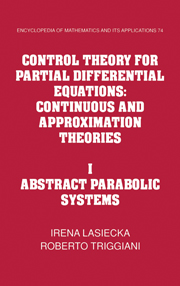Book contents
- Frontmatter
- Contents
- Preface
- 0 Background
- 1 Optimal Quadratic Cost Problem Over a Preassigned Finite Time Interval: Differential Riccati Equation
- 2 Optimal Quadratic Cost Problem over an Infinite Time Interval: Algebraic Riccati Equation
- 3 Illustrations of the Abstract Theory of Chapters 1 and 2 to Partial Differential Equations with Boundary/Point Controls
- 4 Numerical Approximations of Algebraic Riccati Equations
- 5 Illustrations of the Numerical Theory of Chapter 4 to Parabolic-Like Boundary/Point Control PDE Problems
- 6 Min–Max Game Theory over an Infinite Time Interval and Algebraic Riccati Equations
- Index
6 - Min–Max Game Theory over an Infinite Time Interval and Algebraic Riccati Equations
Published online by Cambridge University Press: 05 June 2013
- Frontmatter
- Contents
- Preface
- 0 Background
- 1 Optimal Quadratic Cost Problem Over a Preassigned Finite Time Interval: Differential Riccati Equation
- 2 Optimal Quadratic Cost Problem over an Infinite Time Interval: Algebraic Riccati Equation
- 3 Illustrations of the Abstract Theory of Chapters 1 and 2 to Partial Differential Equations with Boundary/Point Controls
- 4 Numerical Approximations of Algebraic Riccati Equations
- 5 Illustrations of the Numerical Theory of Chapter 4 to Parabolic-Like Boundary/Point Control PDE Problems
- 6 Min–Max Game Theory over an Infinite Time Interval and Algebraic Riccati Equations
- Index
Summary
In this chapter we augment the abstract dynamics of the preceding chapters by introducing, in addition to the control function u, a deterministic disturbance w, which acts upon the system through a disturbance operator of the same class as the control operator. To this two-player dynamic we associate a quadratic cost functional J over an infinite time horizon, which – unlike in preceding chapters – is nondefinite. The resulting min–max game theory consists in minimizing J over all controls u (good players) for a fixed w, followed by maximization of J over all w (bad players). The min–max theory of this chapter may be viewed as a nontrivial generalization of the quadratic cost optimal control theory of Chapter 2, to which it reduces when w ≡ O.
The first part of the present chapter (Sections 6.1–6.18) treats the general case, while the second part (Sections 6.19–6.26) specializes to the physically significant class where the free dynamics eAt is stable. The approach is variational and the resulting theory is sharp. It produces an intrinsically defined sharp value of the parameter γ in the indefinite cost, called here γc (critical γ), γc ≥ 0, such that a complete theory is available for γ > γc, whereas the maximization problem over the disturbances w does not have a finite solution if 0 < γ < γc for all initial conditions.
- Type
- Chapter
- Information
- Control Theory for Partial Differential EquationsContinuous and Approximation Theories, pp. 556 - 644Publisher: Cambridge University PressPrint publication year: 2000

